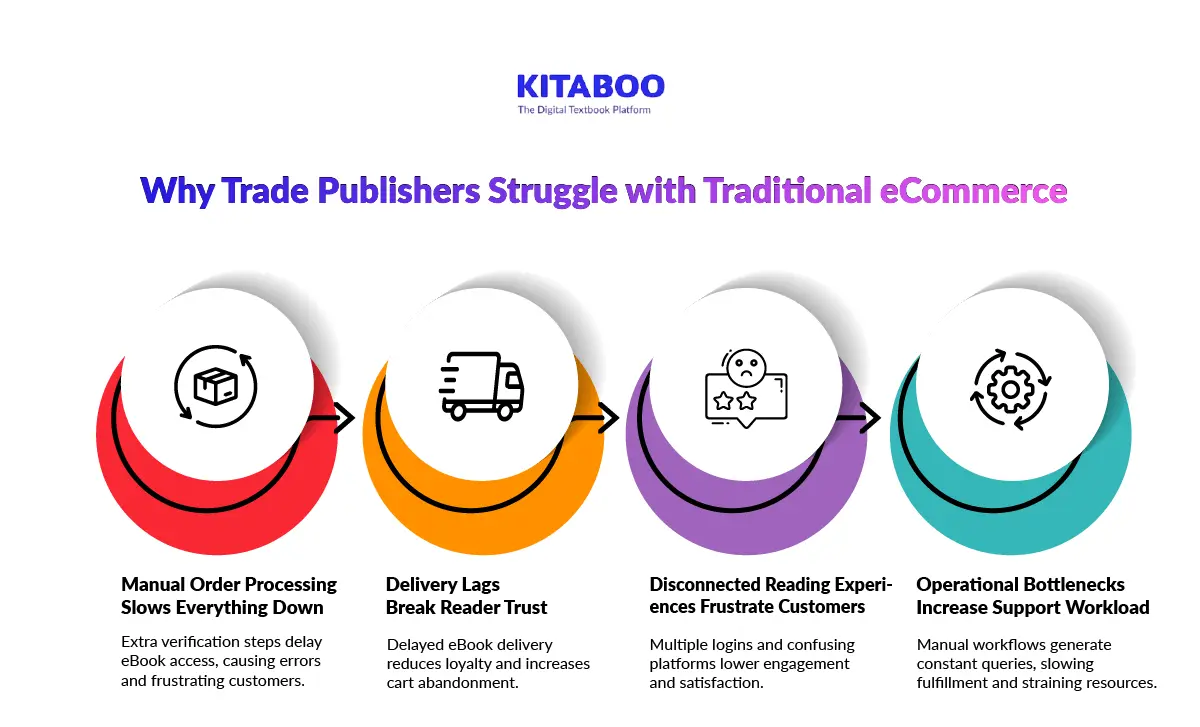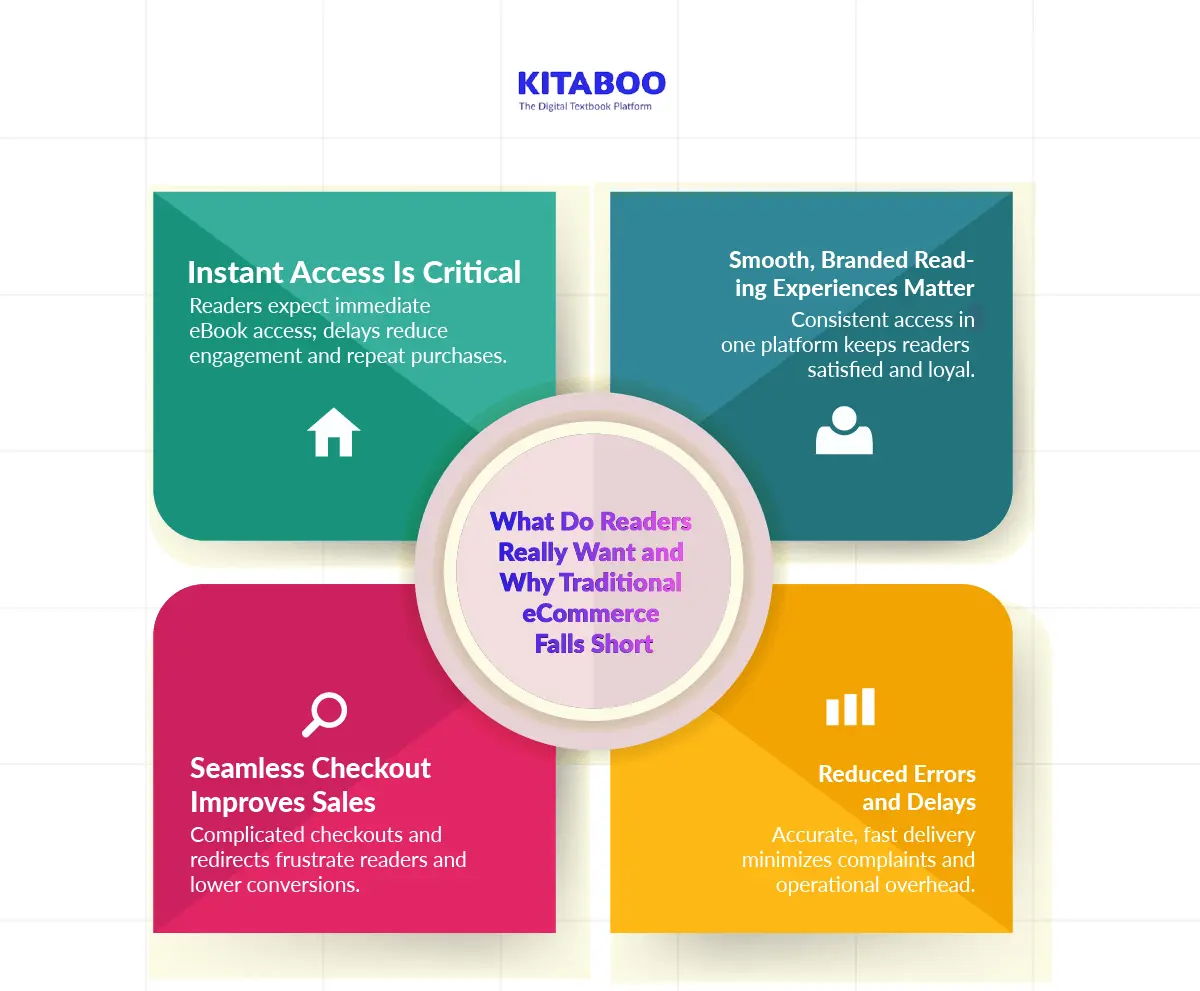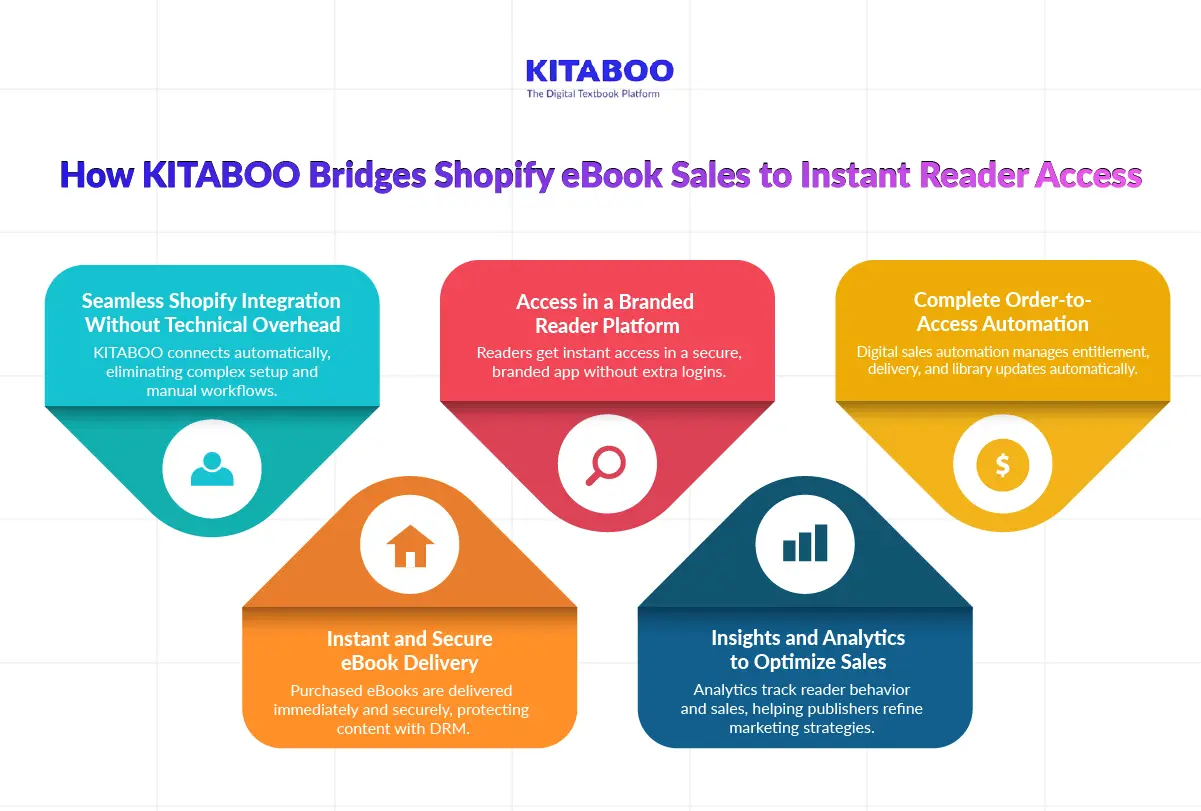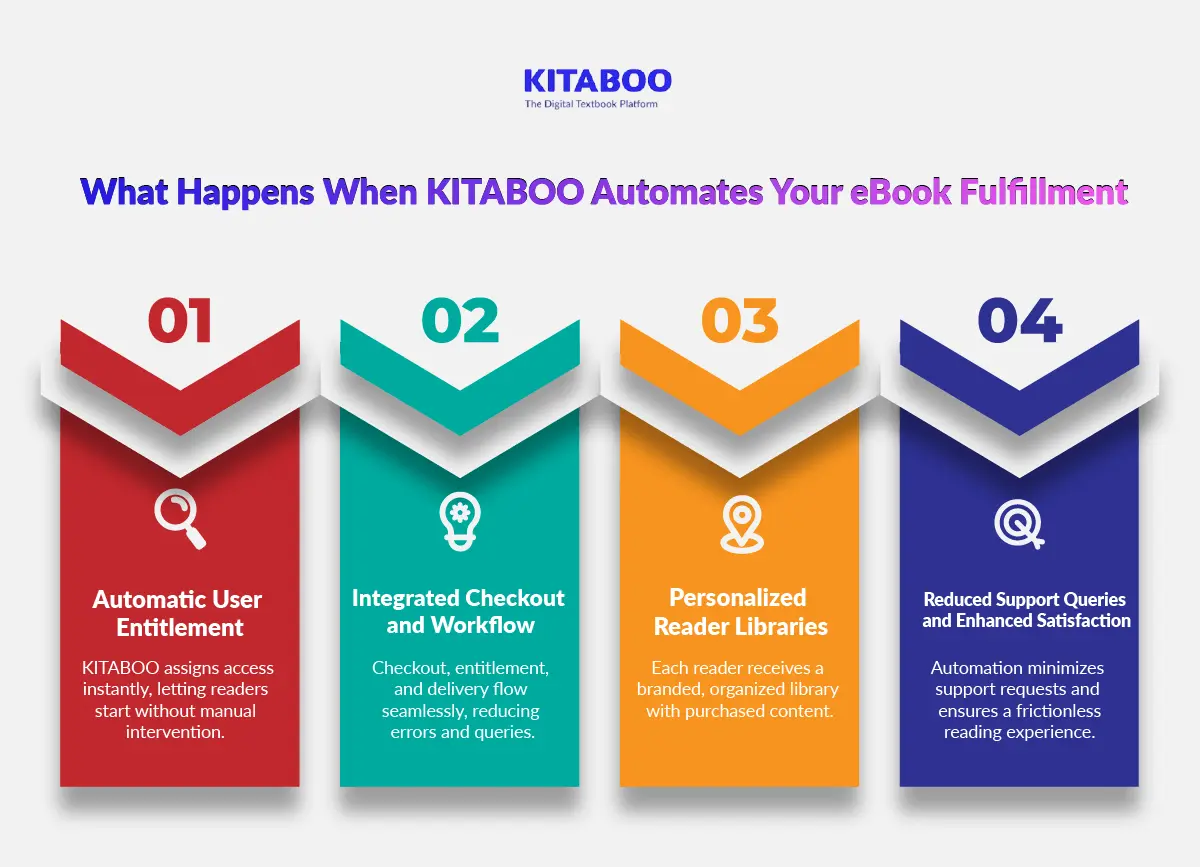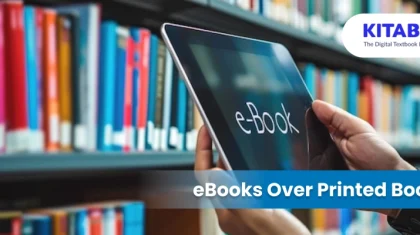
5 Ways How KITABOO Bridges Shopify Sales Directly to Reader Access
Summarize this blog with your favorite AI:
How KITABOO Bridges Shopify Sales Directly to Reader Access – TL;DR
Trade publishers selling eBooks through Shopify often face manual workflows, delayed delivery, and disconnected reading experiences. KITABOO automates the entire order-to-access process, letting customers receive instant, secure access in a branded environment. This reduces friction, improves satisfaction, and eliminates operational headaches.
The integration also protects content with DRM, tracks reader behavior, and provides actionable insights. Publishers benefit from faster sales, lower cart abandonment, and stronger customer loyalty. Overall, KITABOO turns Shopify storefronts into efficient, frictionless platforms for eBook sales and growth.
Here’s a quick summary of challenges and how KITABOO addresses them:
| Challenge for Trade Publishers | KITABOO Solution | Outcome |
|---|---|---|
| Manual order processing | Digital sales automation | Instant entitlement, reduced errors. |
| Delivery delays | Direct eBook delivery | Immediate access, lower cart abandonment. |
| Disconnected reading experiences | Branded reader libraries | Consistent, professional reading experience. |
| Complex Shopify workflows | Shopify eBook integration & Publisher Shopify solutions | Seamless order-to-access automation. |
| Protecting content / IP risk | Automated DRM | Secured eBooks build reader trust. |
| Lack of actionable insights | Analytics & reporting | Optimized marketing, repeat purchases, revenue growth. |
Trade publishers are selling more eBooks online than ever before, yet something still feels off. Readers want instant access, but delays, redirects, and technical steps keep getting in the way. Every extra click risks losing a sale or worse, a loyal reader.
Traditional eCommerce platforms, even ones like Shopify, aren’t built for seamless digital fulfillment. They move books, yes, but they rarely move experiences. For trade publishers, that gap between purchase and access is where engagement fades and opportunities are lost.
Could there be a smarter way to enable direct eBook delivery every time?
Table of Contents
- Why Are Trade Publishers Struggling with Traditional eCommerce?
- What Do Readers Really Want and Why Can’t Traditional eCommerce Deliver It?
- How KITABOO Bridges Shopify eBook Sales to Instant Reader Access
- What Happens When KITABOO Automates Your eBook Fulfillment?
- How Does This Integration Boost Sales, Loyalty, and Content Security?
- Conclusion
- FAQs
Why Are Trade Publishers Struggling with Traditional eCommerce?
The world is moving to Shopify for publishers to sell eBooks online. Yet, trade publishers are facing major challenges. Manual processes, delayed delivery, and disconnected reading experiences create frustration.
These issues slow revenue, annoy readers, and add operational stress. Even after adopting Shopify, publishers cannot meet modern reader expectations.
1. Manual Order Processing Slows Everything Down
Many trade publishers still rely on manual order verification. Each order requires extra steps before readers can access their eBooks.
This slows the sales cycle and frustrates customers. Errors in processing lead to refunds, complaints, and lost trust. Publishers waste valuable time instead of focusing on growth.
2. Delivery Lags Break Reader Trust
Even with Shopify for publishers, eBooks often take hours or days to reach buyers. Delayed delivery damages credibility and reader satisfaction. Customers expect instant access when buying digital content.
Repeated delays reduce loyalty, increase cart abandonment, and limit repeat sales. Trade publishers risk losing market share to faster competitors.
3. Disconnected Reading Experiences Frustrate Customers
Readers face multiple logins, delayed access links, or confusing platforms. This disjointed experience lowers engagement and satisfaction. Many readers abandon purchases or avoid returning to the platform.
Traditional eCommerce systems cannot solve these gaps without automation. Lack of efficient Shopify eBook integration creates a significant barrier to scaling sales for trade publishers.
4. Operational Bottlenecks Increase Support Workload
Manual workflows generate constant customer queries and support tickets. Staff members spend hours resolving access issues instead of focusing on growth strategies.
Even with Shopify for publishers, inefficiencies persist. Delays and errors slow down order fulfillment, strain resources, and hinder growth. Without a smoother system, publishers cannot scale effectively or compete.
What Do Readers Really Want and Why Can’t Traditional eCommerce Deliver It?
Readers now expect a “buy now, read now” experience from even the best eCommerce platforms. Waiting for access frustrates them. Slow delivery reduces satisfaction and loyalty. Traditional workflows of Shopify for publishers cannot keep up with these expectations. Every delay risks losing paying readers.
1. Instant Access Is Critical
Readers want to start reading immediately after purchase. Manual confirmations and third-party redirects slow this process. Direct eBook delivery ensures readers get access instantly. Delayed access reduces engagement and repeat purchases.
2. Seamless Checkout Improves Sales
Complicated checkout steps confuse readers and reduce conversions. Multiple logins or redirect links increase friction. Effective publisher Shopify solutions remove these barriers. Digital sales automation connects the purchase directly to reading instantly. This keeps readers happy and loyal.
3. Smooth, Branded Reading Experiences Matter
Readers prefer consistent access within one platform. Switching between apps frustrates them. Shopify eBook integration via platforms like KITABOO delivers content instantly in a branded environment. Such effective publisher Shopify solutions ensure a seamless reading experience.
4. Reduced Errors and Delays
Delivery errors and slow access force readers to generate complaints and support tickets. Digital sales automation fixes most fulfillment issues. Direct eBook delivery secures instant access to readers while reducing operational overhead.
How KITABOO Bridges Shopify eBook Sales to Instant Reader Access
You can boost eBook sales through seamless eCommerce integration. KITABOO integrates effortlessly with Shopify, automating the complete order-to-access pipeline. Publishers no longer need manual workflows. Customers get eBooks instantly in a branded environment. There are no extra logins or confusing redirects.
1. Seamless Shopify Integration Without Technical Overhead
KITABOO integrates directly with Shopify, eliminating complex setup for publishers. Platforms like KITABOO that support Shopify eBook integration can easily handle workflows automatically.
Trade publishers can manage sales from Shopify while KITABOO delivers content. The technical setup is minimal and straightforward. Automation ensures the order-to-access pipeline functions without errors. This seamless connection reduces operational stress and supports growth.
2. Access in a Branded Reader Platform
Readers receive eBooks immediately in a secure, branded app. KITABOO manages the workflow behind the scenes. Customers do not need additional accounts or logins. Purchased titles appear correctly in their personal library.
Modern eBook readers like KITABOO create a professional, consistent reading experience. Seamless access increases engagement, loyalty, and repeat purchases for publishers.
3. Complete Order-to-Access Automation
Manual steps are eliminated completely with digital sales automation. Entitlement, delivery, and library updates happen automatically. Shopify orders flow directly into KITABOO without intervention. Publishers save time and avoid errors from manual processing.
Readers experience a smooth end-to-end workflow from purchase to reading. This automation ensures frictionless content delivery every time.
4. Instant and Secure eBook Delivery
Once a purchase is completed, there is a direct eBook delivery. Readers gain access immediately without any download delays. With Shopify eBook integration and digital sales automation, KITABOO ensures secure and fast content delivery.
Trade publishers maintain control of Digital Rights Management while providing speed and reliability. Instant access meets modern reader expectations. This strengthens trust, satisfaction, and long-term engagement.
5. Insights and Analytics to Optimize Sales
KITABOO tracks reader activity, purchase patterns, and library usage automatically. Digital sales automation collects data without manual effort.
KITABOO provides actionable insights for better marketing and sales strategies. Trade publishers can refine campaigns, improve conversions, and boost revenue. Analytics turn every Shopify storefront into a data-driven, frictionless revenue engine.
What Happens When KITABOO Automates Your eBook Fulfillment?
You can easily monetize your content with eCommerce integration. KITABOO handles every step automatically after a Shopify purchase.
Users receive instant access to eBooks without delays. Publishers do not need to manually assign entitlements or send links. Shopify for publishers ensures a smooth, reliable reading experience for every customer.
1. Automatic User Entitlement
Once a purchase is completed, KITABOO assigns access rights instantly. Digital sales automation applies permissions without any manual interventions.
Users can start reading immediately in a secure environment. Publishers no longer handle manual approvals. This reduces errors and improves customer satisfaction consistently.
2. Integrated Checkout and Workflow
KITABOO’s publisher Shopify solutions link the checkout, entitlement, and delivery processes seamlessly. No extra steps or redirects confuse readers.
The integrated workflow reduces manual intervention and support queries. Customers can easily complete purchases and start reading instantly.
3. Personalized Reader Libraries
Each user gets a personalized library with purchased eBooks. With Shopify eBook integration, KITAOO ensures content appears correctly in each library without manual interventions.
Readers enjoy a consistent, branded experience every time. Personalized libraries increase engagement and loyalty. Moreover, trade publishers can track access without additional operational effort.
4. Reduced Support Queries and Enhanced Satisfaction
Automatic entitlement, delivery, and library management lower support requests drastically. Digital sales automation resolves common order and access issues instantly.
With Shopify for publishers, customers experience a frictionless journey from purchase to reading. Publishers save time while improving customer satisfaction. KITABOO ensures the process is reliable, secure, and seamless.
How Does This Integration Boost Sales, Loyalty, and Content Security?
KITABOO’s seamless integration with Shopify ensures faster delivery and instant access. Customers complete purchases without delays. Friction-free experiences lower cart abandonment and increase satisfaction. Readers are more likely to return for future purchases.
1. Lower Cart Abandonment
Direct eBook delivery eliminates waiting times that often frustrate buyers. Shopify eBook integration ensures every purchase triggers automatic access.
Smooth, immediate fulfillment reduces abandoned carts significantly. Customers experience frictionless checkout and instant reading. Smart use of Shopify for publishers leads to higher conversion rates and faster revenue realization.
2. Increased Customer Satisfaction and Loyalty
Readers enjoy consistent, branded experiences in their personalized libraries. KITABOO ensures seamless access across all devices.
Digital sales automation eliminates manual errors and delays. Frictionless access builds trust and encourages repeat purchases. Satisfied readers become loyal, long-term customers for publishers.
3. Protecting Intellectual Property with DRM
With Shopify for publishers, KITABOO secures content through automated Digital Rights Management protection. Direct eBook delivery ensures instant and authorized access. Intellectual property is protected while readers enjoy instant access.
Digital Rights Management increases confidence in the platform. Trade publishers reduce piracy risks and maintain full control of their content. While the readers enjoy a safe, secure reading environment.
Conclusion
KITABOO’s seamless integration with Shopify transforms eBook sales for trade publishers. It provides instant access, personalized reader libraries, and frictionless checkout. This automation reduces cart abandonment, secures content with DRM, and boosts reader loyalty.
By streamlining the order-to-access pipeline, publishers can focus on growth instead of manual workflows. Customers enjoy fast, secure, and branded reading experiences.
Transform your Shopify eBook sales today with KITABOO and deliver instant access to every reader. Schedule a demo to get started.
FAQs
Manual workflows, delivery delays, and disconnected reading experiences create friction and slow revenue.
They want a “buy now, read now” experience with instant, seamless access.
Slow delivery, multiple logins, and confusing platforms frustrate readers and reduce loyalty.
Complicated checkout steps increase cart abandonment and lower conversion rates.
Automated workflows, integrated entitlements, and direct eBook delivery streamline the process.
Delays reduce engagement, trust, and long-term customer loyalty, hurting publisher growth.
Discover how a mobile-first training platform can help your organization.
KITABOO is a cloud-based platform to create, deliver & track mobile-first interactive training content.
